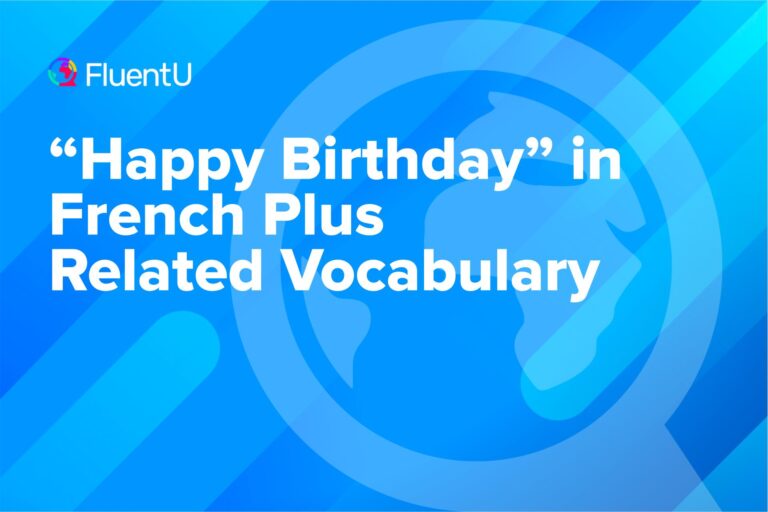Contents
- 1. Qu’est-ce que/qui to Say “What Is…”
- 2. Que as the Question Word “What?”
- 3. Quel as “What” for an Inquiry About a Noun
- 4. Ce que / Ce qui / Ce dont / Ce à quoi as the Indefinite Relative Pronoun “What”
- 5. Quoi as the Informal Version of “What”
- 6. Comment as the Formal Version of Quoi
- 7. Et si to Say “What If?”
- And One More Thing...
Common Ways to Say “What” in French

Did you know that there’s no exact translation of the English “what” into French? In English, we use the word “what” to refer to a lot of different information. In French, on the other hand, “what” is more nuanced. It takes different forms to interrogate, describe, exclaim and move freely within a sentence.
As French learners, once we understand that we still have more to learn about “what” even at more advanced levels, everything changes. So leave your anglophone “what” at the door (not translating in your head will help you do that) and let’s learn how to say “what” in French.
Download: This blog post is available as a convenient and portable PDF that you can take anywhere. Click here to get a copy. (Download)
1. Qu’est-ce que/qui to Say “What Is…”
Qu’est-ce que and Qu’est-ce qui both begin with the words que + est + ce, literally meaning “What is that…?” which in English we’d say as, “What is…?” or simply “What…?”
Deciding whether to follow Qu’est-ce with que or qui depends on the type of information you’re asking about.
Qu’est-ce que means you’re asking after the object of the sentence. You want to know “what” in the sentence is receiving the action of the verb. Take a look:
Qu’est-ce que vous voulez ? (What do you want?)
Qu’est-ce que tu manges ? (What are you eating?)
So you’d answer, respectively, with something like, “I want a new bag” or “I’m eating cake,” where the information provided is the object of the sentence.
Qu’est-ce qui means you’re asking after the subject of the sentence. You want to know “what” is performing the verb, as in:
Qu’est-ce qui se passe ? (What’s happening?)
Qu’est-ce qui te rend heureux ? (What makes you happy?)
In response to these questions, you could say, “The concert is about to start” or “Baking cookies makes me happy.” Here, your answers tell the subject of the sentence.
2. Que as the Question Word “What?”
Que can also stand on its own—and thanks to inversion (e.g. swapping the pronoun and verb), we can see it in all its glory:
Que fais-tu aujourd’hui ? (What are you doing today?)
Que veux-tu dire ? (What do you mean?)
When used in this manner, que will only appear as the first word in the sentence.
3. Quel as “What” for an Inquiry About a Noun
In English, it’s common to use “what” before a noun, as in, “What is your favorite film?”
But in French, it’s technically “which,” as in, “Which is your favorite film?”
The French word for “which” is quel. We understand this as “what” in English. Quel changes form depending on whether the noun that follows is masculine or feminine and singular or plural.
- Masculine: Quel
Quel est son nom ? (What’s his name?) - Feminine: Quelle
Quelle est la date d’aujourd’hui ? (What’s the date today?) - Masculine plural: Quels
Quels sont les avantages d’habiter en ville ? (What are the advantages of living in town?) - Feminine plural: Quelles
Quelles sont tes qualités personnelles ? (What are your personal qualities?)
A bonus point is that the pronunciation of quel and its variants don’t change, only the spelling!
Quel is also used to form exclamations about a noun’s quality, as in, “What a beautiful house!”
I don’t know about you, but I’m getting a Red Riding Hood vibe here. So the next time you go to your grandmother’s house in the forest and notice she has slightly larger teeth than usual, you’ll know to say, “Quelles grandes dents !” (What big teeth!)
4. Ce que / Ce qui / Ce dont / Ce à quoi as the Indefinite Relative Pronoun “What”
There are times when “what” isn’t needed at the beginning or end of a sentence, but instead in the middle. Kind of like a sandwich filling, or in grammatical terms, when it’s connecting two clauses together.
Since we’ve already taken a look at at est-ce qui and est-ce que in relation to the subject and object of a sentence, we can breathe a sigh of relief, as this follows exactly the same formula. The only difference is that we’re going to cut the est part away.
We’re now left with ce qui and ce que.
- When “what” is the subject of a relative clause, use ce qui.
On ne sait pas ce qui va se passer. (We don’t know what’s going to happen.) - When “what” is the object of a relative clause, use ce que.
Montre-moi ce que tu as trouvé ! (Show me what you found!)
Stick with me now, there’s still a bit more.
In French, the preposition de can be used with a verb to introduce an indirect object. If that indirect object is “what,” we use ce dont. In other words: With the preposition de, use ce dont to mean “what.”
J’ai envie de cette télévision. C’est ce dont j’ai envie. (I want this television. It’s what I want.)
Lastly, if an object is introduced by the preposition à, we use ce à quoi to mean “what” instead. For instance:
A: Je pense à cette grosse boîte bleue. (I’m thinking of this big blue box.)
B: Je ne comprends pas ce à quoi tu penses. (I don’t understand what you’re thinking about.)
Ce à quoi can also be used like this:
A: J’ai finalement réussi l’examen. (I finally passed the exam.)
B: C’est ce à quoi je m’attendais ! Vous êtes très studieux. (That’s what I was expecting! You are very studious.)
Confused? That’s okay!
You can brush up on your French relative pronouns here and then read through this section again to get it to click better in your brain.
5. Quoi as the Informal Version of “What”
Quoi as “what” is common in casual speech but should not be used in formal situations or instances when you’re unsure of the level of formality required.
For example, we can rewrite our very first example sentence from the first section in more casual, everyday French as:
Vous voulez quoi ? (What do you want?)
In this manner, quoi appears at the end of the sentence. Here’s another example:
Il voit quoi ? (What does he see?)
Note that using quoi in this way can also indicate surprise. The above could be interpreted as, “He sees what?!” Again, this is informal and should be exercised with care.
Quoi can also be used with prepositions. In these cases, the preposition comes first and then quoi.
De quoi s’agit-il ? (What’s it about?)
Je me demande à quoi elle pense. (I wonder what she’s thinking about.)
Lastly, sometimes in English we use “what” by itself as an exclamation. The French equivalent to “What!” is “Quoi !” which is again an informal manner of expression.
6. Comment as the Formal Version of Quoi
In questions, you can exchange quoi for comment to make the sentence slightly more formal.
Tu fais comment ? (What are you doing?)
It can also replace qu’est-ce que and appear at the beginning of the sentence, like so:
Comment tu fais ? (What are you doing?)
You can further use comment as a standalone exclamation to express surprise or seek further information.
Comment ? C’est incroyable ! (What? That’s incredible!)
T’as réussi l’examen ? Comment ! (Did you pass the exam? What!)
Note that this is less common and may sound slightly too formal in these contexts. In more informal or colloquial speech, quoi is still the preferred word.
To really learn when you should use different phrases, it’s important to learn French in context by observing native speakers. A program like FluentU is good for this.
FluentU takes authentic videos—like music videos, movie trailers, news and inspiring talks—and turns them into personalized language learning lessons.
You can try FluentU for free for 2 weeks. Check out the website or download the iOS app or Android app.
P.S. Click here to take advantage of our current sale! (Expires at the end of this month.)
7. Et si to Say “What If?”
“What if” is a phrase that introduces hypothetical or speculative situations. You can use et si to say this in French, as in:
Et si on partait en vacances ensemble ? (What if we went on vacation together?)
Placed at the beginning of a sentence like this, et si actually expresses a suggestion. A French listener would understand that example to mean: “How about we go on vacation together?”
Here are two more examples of suggestions in this manner:
Et si on allait à la plage le week-end prochain ? (What if/How about we go to the beach next weekend?)
Et si tu amenais ton copain ? (What about bringing your boyfriend?)
This French term can also be used to explore a different outcome or consider a possibility that is not currently true or certain.
Et si demain il pleut ? (What if it rains tomorrow?)
Et si le restaurant est fermé ? (What if the restaurant is closed?)
Note that et si is mostly used in informal situations.
With all these ways to express it, mastering how to say “what” in French will take time. But, you’re off to a great start now!
Download: This blog post is available as a convenient and portable PDF that you can take anywhere. Click here to get a copy. (Download)
And One More Thing...
If you like learning French at your own pace and from the comfort of your device, I have to tell you about FluentU.
FluentU makes it easier (and way more fun) to learn French by making real content like movies and series accessible to learners. You can check out FluentU's curated video library, or bring our learning tools directly to Netflix or YouTube with the FluentU Chrome extension.
One of the features I find most helpful is the interactive captions—you can tap on any word to see its meaning, an image, pronunciation, and other examples from different contexts. It’s a great way to pick up French vocab without having to pause and look things up separately.
FluentU also helps reinforce what you’ve learned with personalized quizzes. You can swipe through extra examples and complete engaging exercises that adapt to your progress. You'll get extra practice with the words you find more challenging and even be reminded you when it’s time to review!
You can use FluentU on your computer, tablet, or phone with our app for Apple or Android devices. Click here to take advantage of our current sale! (Expires at the end of this month.)











